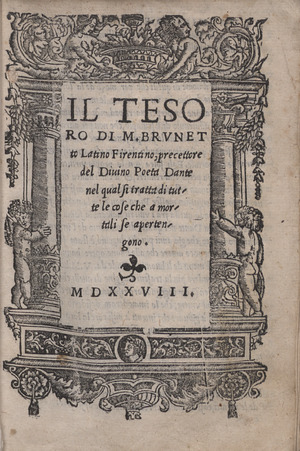Brunetto Latini facts for kids
Brunetto Latini (born around 1220, died 1294) was an important Italian philosopher, scholar, notary (a legal official), and politician. He was known for his wisdom and his writings.
Contents
Life of Brunetto Latini
Brunetto Latini was born in Florence in 1220. His family was noble and from Tuscany. He was part of the Guelph political group. Brunetto was a respected notary and a very learned man. People admired him for his great speaking skills. He often explained the writings of Cicero to help guide public decisions.
He was important enough to be sent on a special trip to Seville, Spain. He went to ask Alfonso el Sabio of Castile for help for Florence against the Sienese. This mission was not successful. On his way back from Spain, he heard bad news. The Guelphs had been defeated at the Battle of Montaperti. Because of this, Brunetto was forced to leave Florence. He lived in France from 1261 to 1268. During this time, he worked as a notary in cities like Montpellier and Paris.
In 1269, the political situation changed, and he could return to Tuscany. For about 20 years, he held many important jobs. In 1273, he became Secretary to the Council of the Republic of Florence. He helped bring the Guelph and Ghibelline parties together for a short time in 1280. In 1284, he led a meeting where they decided to attack Pisa. Finally, in 1287, he became a "prior." This was one of the 12 top government positions in Florence.
Giovanni Villani, a famous historian, said that Brunetto "was a great philosopher and a complete master of rhetoric." This means he was excellent at both speaking and writing well. Brunetto wrote several books and poems. He passed away in 1294. His tomb is in the church of Santa Maria Maggiore, Florence.
Brunetto Latini's Works
While he was in France, Brunetto wrote two important books. One was his Italian Tesoretto. The other was his French prose book, Li Livres dou Trésor. Both books were summaries of all the knowledge known at that time. Li Livres dou Trésor is considered the first encyclopedia written in a modern European language. He also translated some of Cicero's works into Italian.
Publications
- Julia Bolton Holloway, ed. (2021) (in it). Il Tesoro di Brunetto Latino, Maestro di Dante Alighieri. Regione Toscana|Firenze. Archived from the original. Error: If you specify
|archiveurl=, you must also specify|archivedate=. https://web.archive.org/web/20210301222454/https://florin.ms/OpereBrunettoLatino.html.
Brunetto Latini and The Divine Comedy
Brunetto Latini was like a guardian to the famous poet Dante Alighieri after Dante's father died. Many early writers said that Brunetto was Dante's teacher. Dante himself also spoke of Brunetto as his teacher. It is believed that Brunetto and Dante had a strong intellectual and caring connection. Brunetto might have encouraged Dante to read important works by Cicero and Boethius. This happened after the death of Beatrice Portinari, who Dante loved.
Dante included Brunetto Latini in his famous poem, the Divine Comedy. You can find him in the Inferno, in Canto XV.
Canto XV
In this part of the poem, Dante describes meeting Brunetto Latini. Dante shows great respect for Brunetto, more than almost any other character in the Inferno. He calls Brunetto "a radiance among men." Dante also speaks with thanks about the "sweet image, gentle and paternal" that Brunetto was to him. He remembers how Brunetto taught him "how man makes himself eternal."
Dante speaks to Brunetto with a respectful form of "you." Brunetto uses a more informal "you," which might have been how they usually spoke in Florence. The way Dante describes Brunetto shows love, sadness, and a strong sense of dignity. This is especially powerful given the difficult situation Brunetto is in.
Brunetto humbly asks if he can walk with Dante for a while. Dante offers to sit down with him, but Brunetto explains that sitting would make his punishment worse. He and the other souls must keep moving without a clear path.
Brunetto then tells Dante about his future using unclear images. He warns Dante that people from Fiesole will be his enemies. He describes them as blind, greedy, jealous, and proud. Brunetto tells Dante to be careful not to be harmed by them.
Even though Brunetto is in a difficult place in the Inferno, Dante's feelings for him are clear. Dante shows that even great people can have private struggles.
Sources
- Turco, Jeffrey. "Restaging Sin in Medieval Florence: Augustine, Brunetto Latini, and the Streetscape of Dante's Vita nuova." Italian Studies 73 (2018): 15-21.
See also
 In Spanish: Brunetto Latini para niños
In Spanish: Brunetto Latini para niños
 | Jewel Prestage |
 | Ella Baker |
 | Fannie Lou Hamer |


